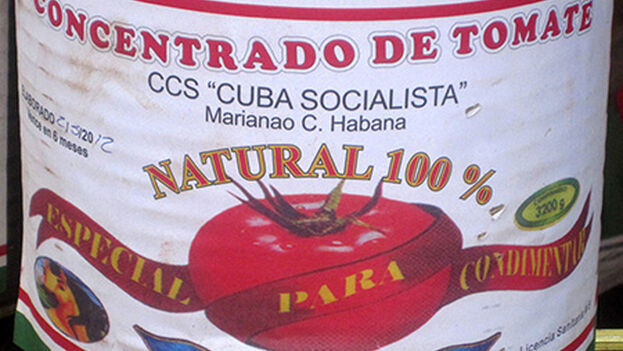
![]() 14ymedio, Marcelo Hernandez, Havana, November 24, 2019 — One of the products most sought-after by the throngs of people inundating the Cuatro Caminos Market has been the tomato, an essential ingredient in many recipes. With supplies scarce and prices for the product high, prepackaged tomato concentrate is the only option for customers who want to prepare pasta, season chickpeas or make a chicken fricasée.
14ymedio, Marcelo Hernandez, Havana, November 24, 2019 — One of the products most sought-after by the throngs of people inundating the Cuatro Caminos Market has been the tomato, an essential ingredient in many recipes. With supplies scarce and prices for the product high, prepackaged tomato concentrate is the only option for customers who want to prepare pasta, season chickpeas or make a chicken fricasée.
Those anxiously searching for this popular item already know that the news this year has not been good. Domestic tomato production has been falling dramatically all year. The causes range from the inability to obtain fertilizer and seeds, difficulties with fuel and a delay in the planting season due to climate issues.
The official press reported that “the Ministry of Agriculture planned on delivering 79,940 tons of tomatoes” but produce markets received only 22,814, barely 28% of the planned total.
Far from the offices of official newspaper editors, long-time tomato farmers are feeling the impact that this is having on their lives. In Lajas (in Cienfuegos province), Remberto Godinez has had to devote part of his land, which six years ago was idle, to planting yuca and malanga instead of tomato, a crop which used to reign supreme on his farm.
“There’s no fertilizer, so it’s difficult to get a crop going,” Godinez explains.
“Also, insect infestations have plagued the crops this year and we have no way of combatting them. And thinking about growing a tomato under netting is just crazy. Where would we even get the cloth?”
Two years ago Godinez began experimenting with growing an “impaled” tomato, a technique that allows the plant to grow vertically. Though little used on the island, the strategy was providing Godinez with good yields and a more marketable product. “I had to give it up because finding the planting stakes was proving difficult,” he explained by phone.
He does not envision an optimistic forecast in the coming months. “It rained a lot in October so we couldn’t set up the seed beds and planting was very delayed. There won’t be as many tomatoes at the end of this year as in the past,” he notes. “I think that any family that can eat a tomato at Christmas should feel very fortunate.”

The high prices for tomatoes listed on chalk boards at local produce markets back up Godinez’ claims. At Havana’s best-stocked markets — examples include the one at San Rafael Street in Central Habana, and the one at 21 and B in Vedado — for several weeks the price for tomatoes has not fallen below 25 Cuban pesos per pound, equivalent to the daily salary of a professional. In Artemisa province, where the plant is also widely cultivated, prices have exceeded 30 pesos per pound. And in Trinidad, a tourist area with high demand from restaurants and hostels, they go for 50 pesos.
Even Cuba’s most important tomato growing province, Ciego de Avila, has not escaped the crisis. According to figures published in the local press, 33,945 tons of the crop were harvested there in 2019 but ultimately only 12,450 tons were recovered from the fields.
The situation in Ciego de Avila is also reducing supplies of tomato-based products — sauces, purees and a wide variety of canned goods — because Ceballos, the country’s largest industrial processor of tomatoes, is located in the province and consumes a signficant portion of the local production.
“The technological supplies didn’t get here on time and, when they did arrived, we didn’t get everything we needed, especially nitrogen fertilizer,” says Nancy Palmero, a producer who, along with her husband and two sons, raises tomatoes on the outskirts of Moron. “We have trouble getting the tomato crop from the field because there isn’t enough fuel, or even crates.”
The worsening energy crisis Cuba has been experiencing in recent months is having a very negative impact on agriculture, a sector hit by other shortages. At the root of the crisis are dwindling supplies at gas stations and a resulting higher demand, which is partially met by black market diesel that has been illegally diverted from the resources of state farms and cooperatives.
The Ceballos company itself confirmed the setback in a recently published report. Last year the industry produced 4,565 tons of tomato-based products, including pasta, puree, sauce and other items. In the first nine months of 2019, however, the figure was only 1,339.
“The few tomatoes we manage to produce we sell out of our house,” says Nancy Palmero. “People are so desperate just to get tomato puree that they snatch them from our hands.”
__________________
COLLABORATE WITH OUR WORK: The 14ymedio team is committed to practicing serious journalism that reflects Cuba’s reality in all its depth. Thank you for joining us on this long journey. We invite you to continue supporting us by becoming a member of 14ymedio now. Together we can continue transforming journalism in Cuba.
